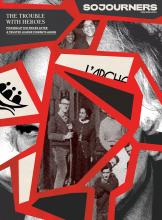NEARLY ALL OF us have encountered a person on the street who is unhoused and asking for help. Perhaps we have felt conflicted about how to respond: Should we give them cash? Should we offer to pay for a meal instead? Will the cash we give cause further harm through the purchase of alcohol or drugs? It can be difficult to know how to engage responsibly at the personal or the policy level with the growing problem of homelessness in the U.S.
Enter Kevin Nye’s illuminating book, Grace Can Lead Us Home: A Christian Call to End Homelessness. Nye offers a new lens through which to view homelessness and, more importantly, our neighbors experiencing homelessness. For him, this is not just another justice issue, but rather his calling: He has devoted much of his adult life to working with unhoused people in Los Angeles.
Grace Can Lead Us Home explains the macro-level causes of homelessness and contributing factors. And it reveals micro-level approaches to engaging with our unhoused neighbors in a way that centers our mutual need for connection and belonging. He discusses the lack of affordable housing that drives this crisis; the inadequate mental health support available to unhoused people; and the surprising truth about substance abuse and addiction affecting homeless populations.
Read the Full Article

